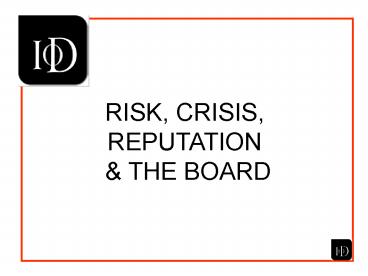RISK, CRISIS, REPUTATION PowerPoint PPT Presentation
1 / 21
Title: RISK, CRISIS, REPUTATION
1
RISK, CRISIS, REPUTATION THE BOARD
2
Some Historic Corporate Disasters
- Early 1980s BCCI
- Late 1980s - Mirror Group early
1990s Guinness Polly
Peck Lloyds of London - 1994 Barings
- mid 1990s Pensions mis-selling
- 1996 Deutsche Morgan Grenfell
- 1997 Natwest Markets
3
Some of Todays Corporate Disasters
- Equitable Life
- Railtrack
- Independent Insurance
- Marconi
4
What are Todays Greatest Risk Issues?
- Financial Risk Fraud
- Health Safety Risk
- Regulatory Risk
- Reputation Risk
5
Newtons First Law as Applied to Business
- Every action is followed by an equal and
opposite reaction. - In our business world we could define action as
the things that go wrong and reaction as - share price will fall
- shareholders, commentators, regulators will
lay blame
6
Responsibility - Who to Blame
- Always lies with the Board
- The directors represent the mind and will
of the company (Common Law) - All corporate power derives from the Board
7
Why? No-one else has the Power
- Business to be Managed by the Directors
- The business and affairs of the Company shall be
managed by the Directors who . . . may exercise
all the power of the Company.
Delegation of Powers to Individual Directors The
Directors may entrust to, and confer upon, any
Director any of the powers, authorities and
discretions exercisable by them . . . and may
from time to time revoke, withdraw, alter or vary
all or any of such powers . . .
(Extracts from the Articles of Association of
the Independent Insurance Group plc)
8
Investors may Sue
- The shareholders . . . are looking at the
possibility of legal action against
Independents directors including the
non-executives.
(FT - 25 June 2001)
Equitable Life is to sue 15 former directors
for 3 billion
9
Social Change
- Shareholder attitudes Hermes, NAPF, ABI,
PIRC - Governance Remuneration Performance
- Litigation, Court awards, Human Rights
- Intelligent organised crime
10
Performance - Reputation
- Never before have directors been more exposed
to criticism, pressure and the risks of civil
or criminal action. - BUT
- good and effective governance is increasingly
recognised and valued
11
Investor Opinion Survey
- Three-quarters of investors say board practices
are at least as important to them as
financial performance - Over 80 of investors say they would pay more
for the shares of a well-governed company
than for those of a poorly-governed company
with comparable financial performance - The actual premium investors say they would be
willing to pay for a well-governed company
differs by country They would pay 18 more
for the shares of a well- governed UK
company...
(McKinsey and Company - June 2000)
12
Measures that Matter
- Our findings supported the US perspective
that non-financial performance drives at least
35 of investors portfolio allocation
decisions.
(Ernst Young - 2000)
13
Post-Crisis Shareholder Value
- Recovery of shareholder value appears to be
directly related to the perceived ability of
the management team in dealing with the
crisis. - Recoverers find that shareholder value rises
for some months or so following this event.
Non-recoverers shareholder value continues
to decline for many months and remains
depressed.
(Dr. Deborah Pretty, Oxford Metrica 2001)
14
How to Reduce the Risks of a Crisis
- Knowledge
- Understanding
- Control
- Preparation
15
Knowledge
- A directors care and diligence will be judged
on what the director knew or should have
ascertained
(Insolvency Act 1986)
16
Understanding
- To improve performance, you have to
understand how better to manage risk
(Turnbull Committee Report September 1999)
17
Control
- The maelstrom of mergers, restructuring,
downsizing and business reorganisations within
(the) industry has diluted management control
and eroded employee loyalty.
(Dr Oonagh McDonald and Viv. Pyne The Competent
Company
18
Preparation
- The boy scouts motto
- Be Prepared
- Define, develop and test a structure to manage
any conceivable crisis.
19
Communication
- Good corporate communications are a vital weapon
in protecting a companys reputation - -----------
- but they must be founded on an effective board
20
An Effective Board
- Essential to Managing Risk Protecting
Rewards - There is no board or governing body in the
world which, if the members think about it,
cannot improve its effectiveness.
(IoD Standards for the Board)
- The questions to be asked are
- are we competent?
- are we knowledgeable and aware?
- are we learning?
- do we evaluate our own performance?
21
Final Comment
- KPMG Survey
- More than two-thirds of 160 NEDs from
FTSE 350 companies believed they would
benefit from a formal appraisal. Fewer than
25 received one. - 70 did not receive guidance in areas such
as crisis management . . .
(FT 5 November 2002)

